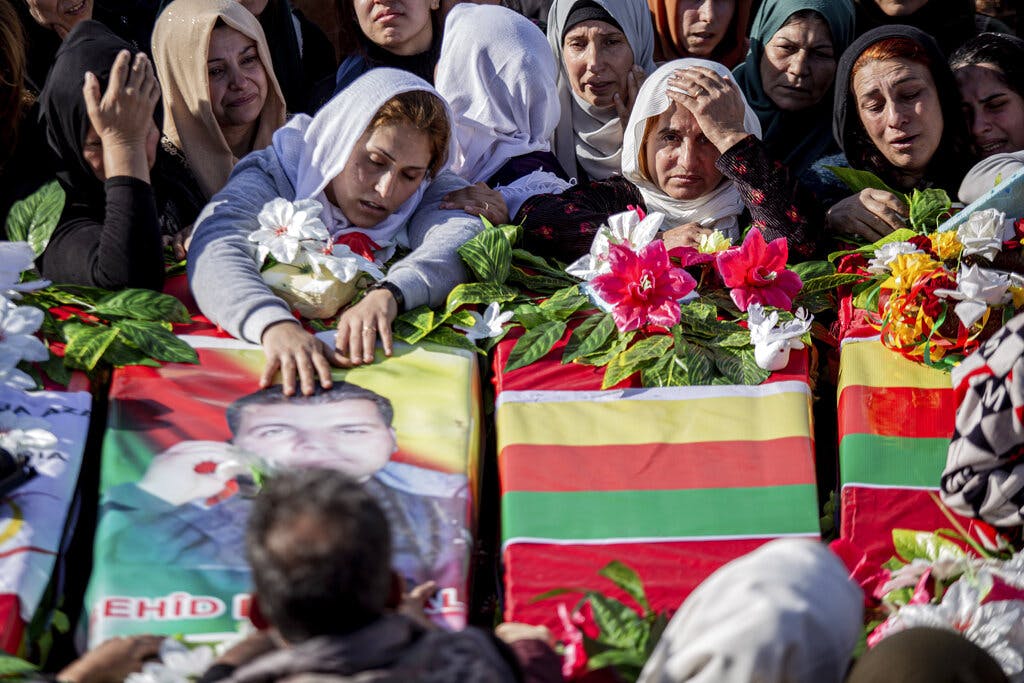Washington Mostly Mum as Turkey, Iran Attack Our Kurdish Allies
The Kurds are being used as scapegoats because Turkey’s president is facing a tough election battle and Iran’s mullahs are cornered by the months-long revolution in that country. Will Biden step in to help?

UPDATED at 6:38 p.m. EDT
As Turkey — a member of NATO — and Iran mercilessly intensify attacks on their region’s Kurds, Washington’s tepid response is disappointing America’s allies.
For days, Turkish drones, planes, and artillery have been pummeling Kurdish targets in Syria and Iraq in what President Erdogan said today was “just the beginning.” At the same time, the Islamic Republic has bombed villages in its Kurdish regions and across the border, in Iraqi Kurdistan.
Iran and Turkey are targeting Kurds because “both of them, for different reasons, are cornered,” the director of the Washington-based American-Kurdish Information Network, Kani Xulam, told the Sun.
Mr. Erdogan is worried that if he loses next year’s election, “a lot of dirt would be uncovered on him,” and the Iranian regime has been unable to end the uprising sparked by the death of a young Kurdish-Iranian woman, he added.
Both Ankara and Tehran have long scapegoated minorities — and especially the Kurds — to deflect attention from domestic troubles. The Islamic Revolutionary Guard Corps assault on Kurdish Iranians, combined with almost daily bombardment of Iraq’s Kurdish autonomous region, is a clear reaction to the months-old revolution.
Initially, protests started in Kurdish towns, but the revolution quickly spread to the rest of the country, and Iranians from all walks of life now call to overthrow the mullah regime.
Ankara has blamed a Kurdish group, known as the PKK, and its Syrian affiliate, the YPG, for the November 13 deadly bombing at Istanbul. Evidence for that assertion is thin, and a woman arrested in the case, Ahlam Albashir, is a Syrian Arab with no known ties to any Kurdish groups.
At the same time, addressing his party at Ankara’s parliament today, Mr. Erdogan threatened a land invasion of three Syrian Kurdish towns — Tel Rifat, Manbij, and Kobani — that he said “are the sources of trouble.”
Recent air strikes “directly threatened the safety of U.S. personnel who are working in Syria with local partners to defeat ISIS and maintain custody of more than ten thousand ISIS detainees,” the Pentagon’s press secretary, Brigadier General Patrick Ryder, said in a statement released late today.
The recent Turkish-Iranian uptick in assaults against the Kurds was launched almost simultaneously last week. Several months ago an unidentified senior Iraqi official told an Iraqi-based Kurdish television, Rudaw, that the Iranian and Turkish militaries are coordinated, adding however that it was unclear at what level the cooperation takes place.
In July, Mr. Erdogan traveled to Tehran, where he met President Putin and his Iranian counterpart, Ebrahim Raisi. The three vowed to cooperate to “ultimately eliminate terrorist individuals, groups, undertakings, and entities.”
Yet, Russia, a strong ally of the Syrian president, Bashar Assad, has strongly opposed a Turkish invasion of that country, even as now it seems to shrug off Mr. Erdogan’s latest threat. Russia has no troops in the Kurdish areas, where America maintains a military presence.
President Trump’s 2019 betrayal of the Kurds, who have for years fought alongside Americans against the Islamic State in Syria and Iraq, has been roundly criticized — so much so that Mr. Trump later announced a small American contingency would remain in Syria. As of yet, President Biden’s moot reaction to Mr. Erdogan’s assault on America’s Kurdish allies has not received as much attention.
Mr. Biden’s coordinator in the region, Brett McGurk, has also worked in the same capacity for Presidents Obama and Trump. He has left the Trump administration after the decision to withdraw troops from Syria. This week, after Turkey bombed YPG posts there, Mr. McGurk warned against actions that could “destabilize the very difficult situation in north-east Syria,” adding that America wants to assure that the Syrian border with Turkey is “secure.”
Such timid statements from the White House, Pentagon, and Department of State are “absolutely not strong enough when compared against Turkey’s threats and certainly not enough to deter further Turkish aggression,” the commander of the U.S.-backed Syrian Democratic Forces, Mazlum Kobane, told al-Monitor in a rare interview.
“They need to do more,” Mr. Kobane said, adding that Turkey would not dare to invade if it heard strong opposition from America and Russia. Yet, for now, he said, both countries have chosen “to remain silent.” He said that he was yet to talk to Mr. McGurk, and that following Washington’s further assessment of Ankara’s new threats, he hoped for better American coordination with the Kurds.
Meanwhile, the state and treasury departments imposed today a new set of sanctions against Iranian officials involved in assaults on the country’s Kurds. Also, referring to Iranian attacks on Iraqi Kurdistan, the state department’s spokesman, Ned Price, yesterday condemned “repeated and brazen violations of Iraq’s territorial integrity,” and called on Tehran to “refrain from further threats and violence.”
To date, Tehran has ignored such admonitions. Additionally, sanctions imposed on its officials, which mostly target their assets outside of the country, have barely registered; these officials have little, if any, such assets.
Evidently frustrated, the prime minister of Iraqi Kurdistan, Masrour Barzani, today urged the “international community” to “adopt a serious stance against the attacks.”
The intensified, double-barreled attack on America’s Kurdish allies in Syria, Iraq, and Iran should raise many more alarm bells in Washington than it seems to have done so far. The Biden administration appears too engaged elsewhere to pay sufficient attention.
This article has been updated with a statement from the Pentagon.

